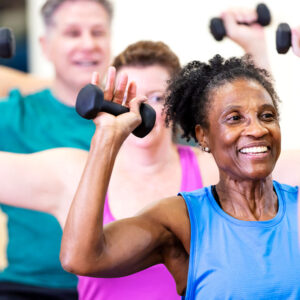
SLASH Heart Risks in a FRACTION of the Time
The American Heart Association recommends 150 minutes of weekly exercise to boost heart health.
But let’s face it.
If you’re overweight and out of shape, just thinking about doing that much exercise can be overwhelming.
The good news? It only takes a fraction of that time to make a dramatic difference in your heart health.
A recent study published in the European Heart Journal took a novel look at exercise and heart health.
Researchers tracked movement patterns throughout the day instead of assessing the benefits of a set amount of exercise time.
Unsurprisingly, they discovered moderate to vigorous activity had the most significant positive impact on heart health.
But they ALSO found that light activity, standing, and even sleeping are also good for your heart.
And sedentary behavior, as expected, was detrimental.
Next, the researchers assessed what would happen if one behavior was exchanged for another.
Adding in as little as 5 minutes of moderate to vigorous activity to your daily routine could have a measurable impact on heart health if it REPLACES sedentary behavior.
However, the biggest benefit occurred when sitting was replaced with more vigorous activity. This could include a brisk walk, climbing stairs, or any other activity you enjoy that increases your heart rate.
In general, those who were the least active benefitted the most when they moved more.
For example, replacing 30 minutes of sitting with moderate or intensity exercise led to a 2.4 percent decrease in BMI (body mass index), a 2.7 percent decrease in waist circumference, and a 3.6 percent decrease in glycated hemoglobin (a measure of blood sugar).
This translates to measurable decreases in your risk of heart attack and stroke.
However, it’s worth noting that this is NOT a one-and-done situation. You’ll only get the benefits of movement if it’s a lifestyle change and you do it regularly.
But the BIG takeaway is it doesn’t take much effort to get significant benefits .
P.S. Supercharge your exercise routine REGARDLESS of what you choose to do. (Easy!)
SOURCE:
Joanna M Blodgett, et. al., “Device-measured physical activity and cardiometabolic health: the Prospective Physical Activity, Sitting, and Sleep (ProPASS) consortium,” European Heart Journal, 2023, ehad717, doi. org /10.1093/eurheartj/ehad717
Written By Dr. Richard Gerhauser, M.D.
For years he’s been the trusted doctor for celebrities, world-class athletes, and countless seniors looking to reclaim their health.
And now…for the first time ever… he’s making his medical breakthroughs available to readers all across America.
Dr. Richard Gerhauser, M.D. is one of the most pioneering and innovative minds in medicine today – and he delivers cutting-edge cures each month through his Natural Health Response newsletter.
Natural Health Response readers get full access to Dr. Gerhauser’s protocols for chronic pain… heart disease… diabetes… Alzheimer’s… and even cancer. These are the very same treatments Dr. Gerhauser recommends to his own patients at his practice in Tucson, Arizona.
In addition to being a board-certified medical doctor, Dr. Gerhauser has earned two master’s degrees and has served as a clinical professor at the University of Arizona.
And as a physician at the world-famous Canyon Ranch, Dr. Gerhauser treated celebrities from around the world who paid dearly for the type of next-generation health information he provides Natural Health Response readers each month.
View More Free Articles
Mother Nature's Bone-Building Secret REVEALED
Mainstream medicine has peddled the same old song and dance about osteoporosis for years. Pop some calcium pills… do some jumping jacks… and cross your fingers that your bones don’t crumble like a stale cookie. But what if I told you Mother Nature has been hiding a bone-building secret right under our noses? And we […]
The INCREDIBLE Payoff for Delaying Diabetes
If you don’t know where your blood sugar levels stand, it’s time to get them checked. It’s estimated that one in three adults has prediabetes, yet 80 percent of these folks have NO IDEA they’re in this category. That’s a BIG problem because most people will develop type 2 diabetes within just five years of […]
The Biggest Dementia Risk Factor REVEALED
I’m sure you’re familiar with the Skeleton Dance song… “The foot bone is connected to the leg bone. The leg bone is connected to the knee bone…” It’s easy to think of our bones being linked because we can physically see them. What’s less obvious is that everything else about your health is JUST as […]
It's NEVER Too Late to Kick This Dangerous Habit
You’ve heard it a million times before: “Smoking is bad for you.” If you’re still lighting up, I bet you remember a time when smoking wasn’t just accepted—it was downright fashionable. Remember when you could smoke in restaurants, on airplanes, and even in hospitals? Heck, movie stars even made it look cool and sophisticated. Well, […]
The TRUTH About ED No One's Talking About
It’s a subject most men would rather sweep under the rug… erectile dysfunction (ED). But you’re not alone if you’re having trouble in the bedroom. In fact, ED affects up to 30 million men in the U.S. alone. However, popping a little blue pill isn’t the answer. ED drugs are often just slapping a Band-Aid […]
Don’t Let Muscle Loss RUIN Your Golden Years
For older women, muscle mass can take a nosedive after menopause. This means more than trouble carrying in the groceries. Over time, the decline in muscle mass can lead to mobility problems, balance problems, falls, and ultimately a loss of independence. Staying active is a critical piece of the puzzle. But now, researchers have discovered […]
The Bad Habit Causing Lupus
All autoimmune diseases are on the rise—but lupus is one of the worst. When the condition strikes, your immune system starts to attack healthy tissues. Lupus cases have increased by 60 percent in women and have increased six-fold in men over the past four decades. What’s driving this dramatic increase? Well, we might have found […]
SHOCKING Missing Piece of the Diabetes Puzzle Discovered
I’ve been saying for years that there’s MORE to type 2 diabetes than your weight—or even your diet. Sure, they play their part. But unless you’re adding in THIS missing piece of the puzzle, you could be increasing your risk of type 2 diabetes despite your best efforts to avoid it. And you’ll never guess […]
Ditch the Chips and DEFY Aging
Sometimes, you just want something to crunch on. The craving can send even the most health-conscious among us heading straight to the snack aisle. But before you reach for the potato chips—which can contain all kinds of harmful ingredients—I have a better idea. Try THIS crunchy, healthy snack instead of loading up ingredients that can […]
Is Aspirin DEADLY? (Get the Truth Here)
Old habits die hard… especially when we’ve been led to believe they’re good ones. We were told for years that taking an aspirin a day would lower the risk of heart attack and stroke. But for many, those were empty promises that came with a LOT of risk… and LITTLE reward. That’s why, if you’re […]










